On 11-13 March, leaders, managers and directors from the UK’s retail societies gathered for the Co-operative Retail Conference, organised by Co-operatives UK and sponsored by VME Co-op. Here’s what happened …
Retail trends and analysis
“The retail landscape has changed rapidly over recent years” said Rhian Thomas, head of shopper insight at the Institute of Grocery Distribution (IGD), sharing key insights and predictions at the opening session of the Co-operative Retail Conference. “We have seen changes in weeks and months that would normally take years.”
Ms Thomas said that while some shopper behaviours have returned to pre-Covid levels, other changes may be permanent – such as more time spent on meal planning (and therefore fewer impulse purchases). People are shopping around for the best grocery deals and two thirds of those surveyed by IGD said they were cutting down on out of home spending, such as dining out, creating opportunities for retailers to offer ‘dine-in’ alternatives. There is also likely to be a division in how shoppers are coming out of Covid-19, she said, with a stark rise in meal skipping seen in families with children.
Related: The challenges facing small co-ops – and how to overcome them
When it comes to sustainability, IGD has identified a heightened awareness from shoppers of food waste, which Ms Thomas believes is a result of people spending more time eating at home during the pandemic and therefore seeing how much food gets thrown into their own bins. IGD’s research has identified that around a third of shoppers want to do more to reduce their impact on the environment, but don’t know what they should do, and want guidance from their retailers; Ms Thomas said that one growing area of interest for IGD is environmental labelling.
Changes in technology, such as ‘just walk out’ tech used by the likes of Amazon Go, and facial recognition, which is starting to be used in retail in countries such as China, were also discussed. Considering how co-ops might make the most of this innovation whilst being mindful of ethical values around privacy and data ownership is likely to be an ongoing conversation for co-ops.
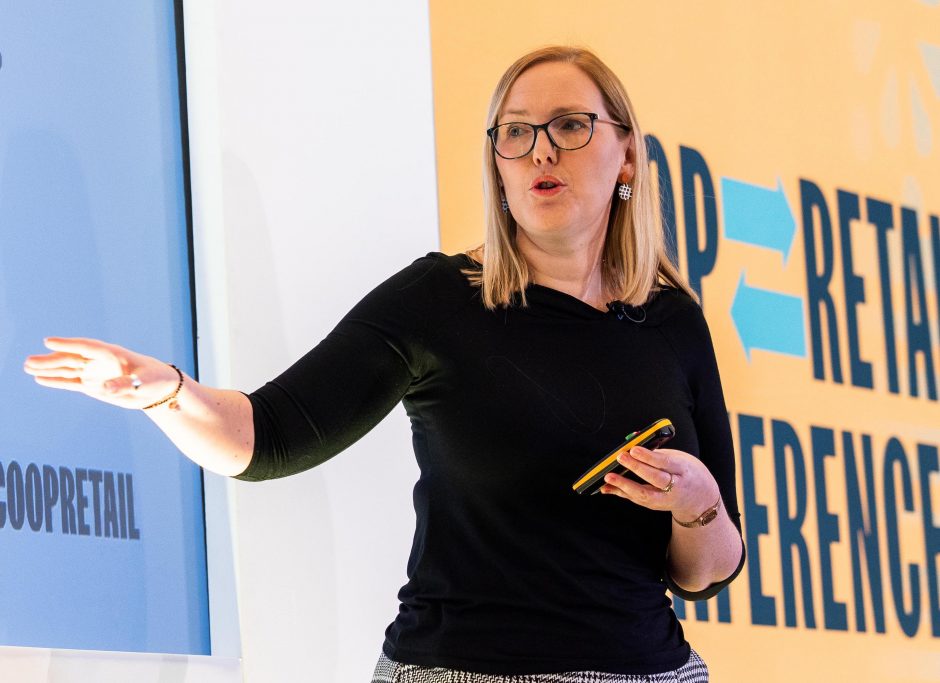
Navigating the post-Covid landscape:
Also presenting analysis at the event was Professor Jonathan Reynolds from the Saïd Business School at the University of Oxford. He explored the challenges and opportunities for co-ops – particularly around the economy, technology and place.
He highlighted how the legacies of Covid, Brexit and the war in Ukraine each contributed to the accumulating impacts of inflation, disrupting supply chains and increasing energy costs – in turn impacting businesses, the labour market and the ability of consumers to reach those businesses and trade with them.
“Nobody has had a good pandemic either from a trading or a human point of view,” he said, but added that the impacts will be different depending on where a business is in relation to consumers and channels.
He believes there are also lessons to be learned, particularly around online trading and the role of technology, and he echoed Ms Thomas’ assessment of the rapid advances in e-commerce during the pandemic.
Related: Key trends convenience retailers need to watch out for
“Retailing has always been driven in part by technological change … but look around the world, there are places where the future is already happening,” Prof Reynolds said, citing some of the advanced AI, VR and volumetric telepresence (holographic) capabilities being tested to resolve different customer problems, from queuing to sustainability and food waste.
In most places, though, the focus is on “finding a way of reviving communities who have been badly affected by Covid” and looking at how to reimagine retail in this new economic reality.
“Post-pandemic there’s been a redistribution of demand, which is not economic from a commercial point of view – but there’s a social angle to this which is really important, and which co-operatives can address.”
Principle 6: Solidarity among retail societies
The sixth co-operative principle (co-operation among co-ops) is a key part of the co-operative movement, and yet UK law is not set up to support this way of working. This is particularly evident when looking at competition law, which creates a difficult environment for retail co-ops wishing to work together. Aaron Stewart (VME Coop) and Linda Barlow (Co-operatives UK) spoke about the newly formed Co-op Law Association (CLA) and how, when it comes to co-operatives working together, competition law risk may require a pause, but doesn’t need to be a full stop.
Competition law exists to try to maintain an even playing field among businesses: though it is important for co-ops to be mindful of competition law, “we shouldn’t let fear paralyse us”, said Mr Stewart, adding that there are ways co-ops can practise principle 6 without contravening competition law.
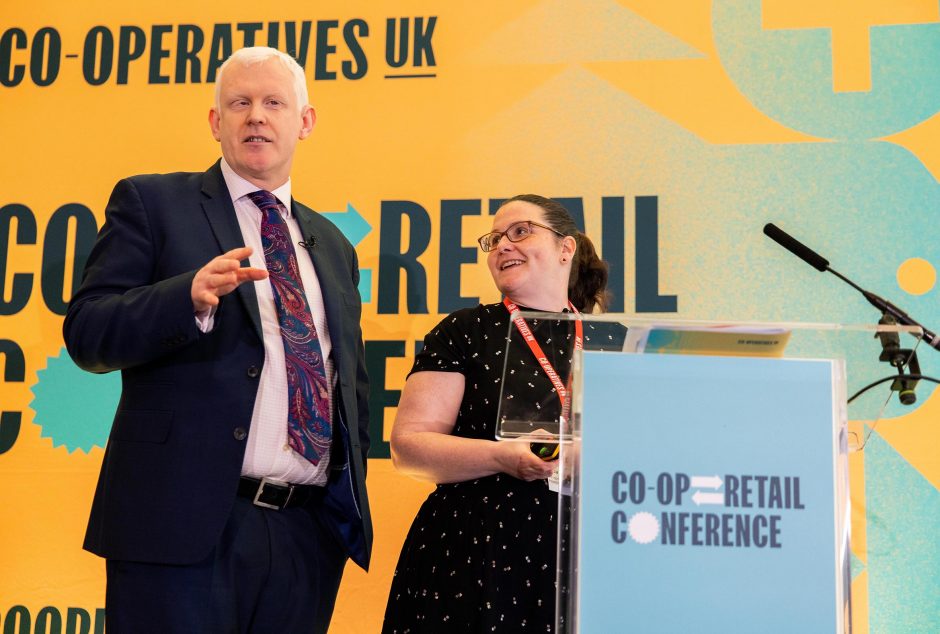
This includes contributing staff time to other co-ops through volunteer days that would normally be spent at charities, or making it a policy to actively seek co-operative suppliers. The idea of co-ops lobbying the government for changes to the law which may be more accommodating for the way co-ops work was also raised, receiving a warm response from a number of people in the room.
Competition law is just one issue co-ops have to deal with that could benefit from a dedicated space for legal practitioners. Because of this, the aim of CLA is to be a place “where lawyers and practitioners working in co-ops can come together to bounce ideas around, especially where the law doesn’t quite fit with the way co-ops operate and govern themselves”, said Ms Barlow.
Building a movement
Ahead of the Retail Conference, Co-operatives UK unveiled its new branding and strategy, and a new aim: By inspiring everyone to be a member of a co-op, and every co-op to be one of our members, we will help create a fairer society together.
Alongside a new logo, the co-op marque is now being used by the organisation in a badge to help build a national movement. Continuing the conversation on ‘Building a movement’, delegates heard from a number of co-op leaders.
At Lincolnshire, CEO Ursula Lidbetter found herself being asked why a shop selling milk and groceries is also building a science park. “I could have a 15-minute talk with that person – and great, they might get it,” she said. “But my colleagues on the checkout don’t have 15 minutes to explain what the co-op is to people who might be interested. How can we boil it down so it’s in the language of someone who is in our communities, not in co-ops?”
The result at Lincolnshire is a new purpose: to bring together ideas, energy and resources to make life better in our communities. “It doesn’t say co-op, but it explains what a co-op does.”
Lincolnshire has strong roots in the region and collaborates with local businesses and institutions. “Co-operation has to happen because people want and need to come together,” says Ms Lidbetter. “You need to start with the urgent need and collaborate in the right structure to add power to addressing that need. It’s about bringing people together with a philosophy of co-operative effort. By doing that, you can make a massive change in the world.”
Midcounties CEO Phil Ponsonby believes that embracing a wider co-operative ecosystem is a vital part of building co-operation: “It’s partly about will and desire. We need to think braver, be a bit more humble and acknowledge that biggest isn’t always best. We also need to embrace technology and fix the problem of not being able to use member cards in other co-ops.”
At Midcounties, the long-term ambition is to be a member-first organisation. “In reality, most of a retail co-op’s transactions are with non-members,” he said. “We want to change that. We’re there with energy and childcare, but not with food yet.” Alongside this, he adds, there is space for the movement to grow by co-ops being ‘trusted brokers’ for goods and services from other co-ops.
“We’re all trying to recruit members to be part of our co-op, but what we should be saying is ‘if you join our co-op, you’re also becoming part of a co-op movement’.”
For Don Morris (CEO at Radstock and chair of Co-operatives UK), awareness and collaboration are key. “Members of Co-operatives UK have access to services and advice – that’s vital to a small business,” he said.
Similarly, at Radstock, there is a strong local presence and good relationships with local suppliers, but the connection to [co-op buying group] FRTS and other societies are very important. “We’re part of something bigger; sometimes we have gone to our larger neighbours, asking advice from those who have been there and done what we are trying to do and have been inspired,” he said, adding that co-operation among co-operatives is critical for building a strong movement together.
Cllr Denise Scott-McDonald was elected president of the Co-op Group’s National Members Council in 2021, and also serves as the deputy leader of Greenwich Council. “Education is so important to the co-op movement,” she said, highlighting the Co-op Group’s activity around co-operative member education, training and information (CMETI). “Ordinary people can do extraordinary things in a co-op, but it’s a question of how we have all those conversations in the first place.”
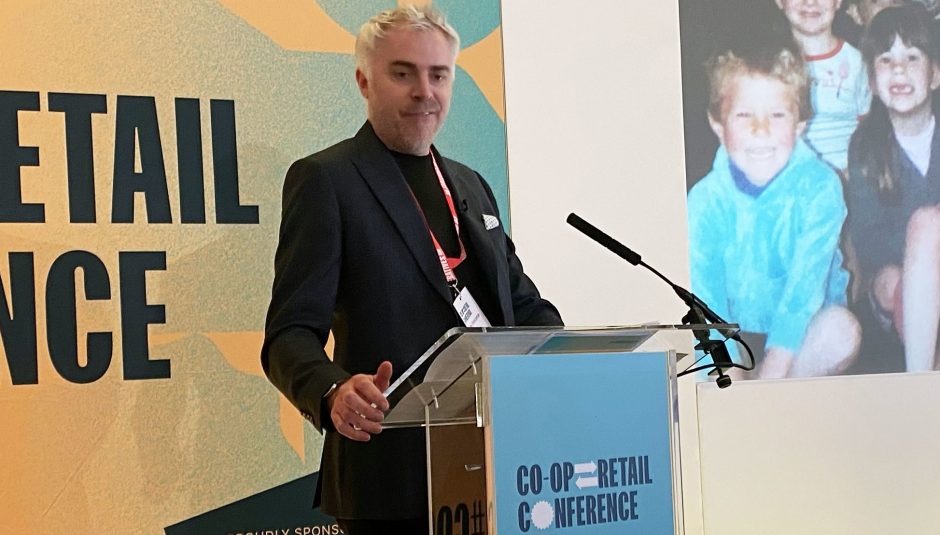
Planting trees you’ll never see: How to engage young people
Former Blue Peter producer, Ewan Vinnicombe-Wallis, shared insights into how he breathed new life into the Blue Peter Badge scheme through competitions and campaigns. He described the excitement he felt as a child receiving a badge and a letter, and how he wanted to recreate that experience for his young audiences.
Despite being in an increasingly digital age, Mr Vinnicombe-Wallis saw the value of the personal touch a paper letter can bring and during his time at Blue Peter increased the amount of physical post the show received.
Related: A co-op membership card: the Blue Peter badge of retail Interview with Ewan Vinnicombe-Wallis?
Central England Co-operative CEO Debbie Robinson also shared experiences of working in the community with children and their families, including a community garden, art projects and outdoor events. Central England runs over 500 community events every year, which Ms Robinson highlighted as a key part of getting young people and families to build a relationship with the stores and the society as a whole.
Mr Vinnicombe-Wallis stressed that co-ops don’t need to be shy about blowing their own trumpet: “Communicate your great achievements – you’re not bragging, you’re just telling people about it, and then other people brag.”
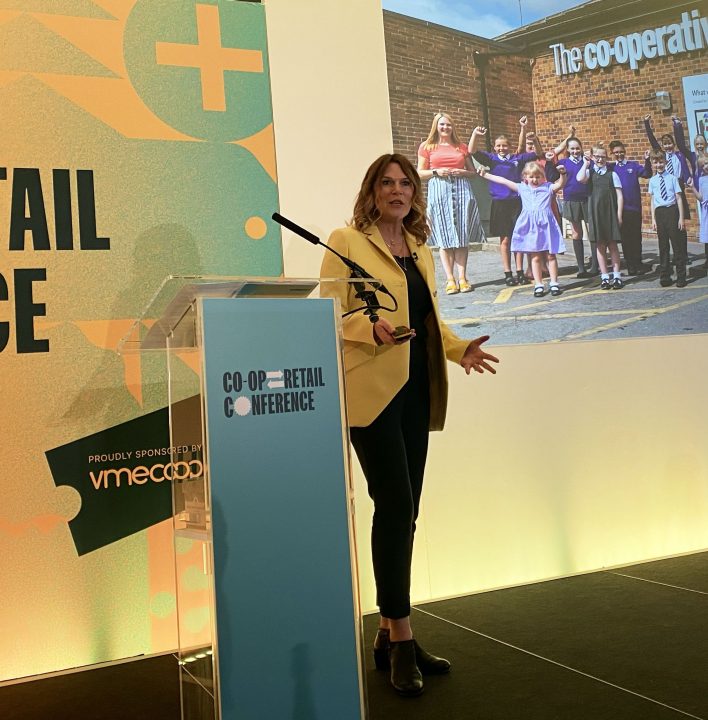
The Apprenticeship Levy
Russell Gill, head of community delivery at the Co-op Group, shared how the organisation is working with other employers to bring together funding to support thousands of apprenticeships.
“It’s a real co-operative success story coming as a result of trying to solve a real-world problem,” he said. “It fundamentally gives more opportunities for young people and under-represented people in the workforce.”
The Apprenticeship Levy is an amount paid at a rate of 0.5% of an employer’s annual pay bill if that bill is more than £3m. Employers can spend the levy on apprentice training and end-point assessment – but must do so within two years.
Related: Co-op Group calls for action to unlock millions in unspent apprenticeship funds
The Co-op Levy Share Initiative brings together pledges of otherwise expired levy contributions from donating employers and matches them to suitable requests, with a specific focus on under-representation. A criterion of the scheme is that any employer has to be paying the national living wage.
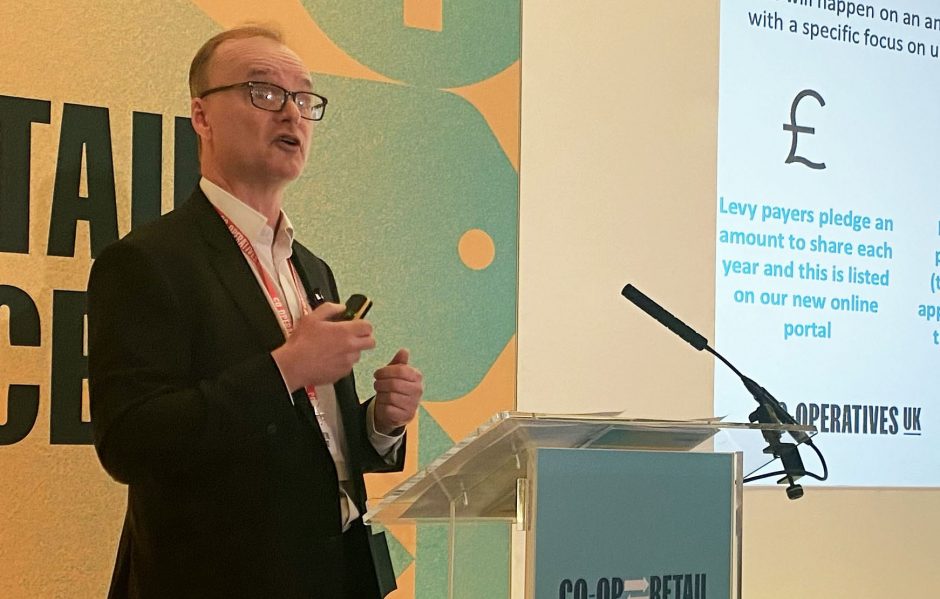
So far, the scheme has attracted pledges of £9.75m from 34 organisations, with 503 matched apprenticeship opportunities.
“The organisations participating are a real mix,” adds Mr Gill. “We’ve got support from the mutual sector, from the public sector, from major corporates and co-operatives: an effective bunch of employees all recognising that we can all play our part by co-operating and working together to provide opportunities for young people to participate.”
Campaigning for shop workers
In the final session of the day, Co-operative Party general secretary, Joe Fortune, highlighted how the organisation campaigned co-operatively for the greater protection of retail workers. “We were motivated to see what we could do to bring change to an awful set of circumstances. It really was a collective effort that the co-operative movement came together for,” he said.
In 2018, the Co-op Group launched its Safer Colleagues, Safer Communities campaign to address violence and crime affecting colleagues. As the pandemic unfolded, violence against shopworkers increased, and the Co-op Party, co-operatives, other retailers and trade unions came together to raise awareness, incentivise police action and strengthen existing laws.
“We knew there was an opportunity for change, but we needed to ensure that we used all the networks we could to bring about those changes,” said Mr Fortune. “We worked together. We didn’t work on our own, in silos, or as individuals within independent societies, we worked all together and showed co-operative leadership.”
What else happened?
A raffle was held with prizes donated by co-operatives, including hampers and a new Fairphone, which raised over £1,000 for Kandoroo – a co-operative addressing food poverty by working with care professionals to distribute electronic vouchers through an app or card for eligible clients to use within participating stores. Kandoroo wanted to raise £100,000 and asked for pledges, with Central England Co-operative making the first pledge.
On the Sunday, Liz McIvor presented the work of the Co-operative Heritage Trust and a new 35 minute film, supported by Co-op News, that gives a whistle-stop tour of the movement.
Sunday morning also saw delegates take part in a workshop on Innovation and growth. A 90-minute design sprint was led by Naomi Timperly of Growth Strategy Innovation and Tech North Advocates on themes including Principle 6, engaging young people and digital inclusion.

